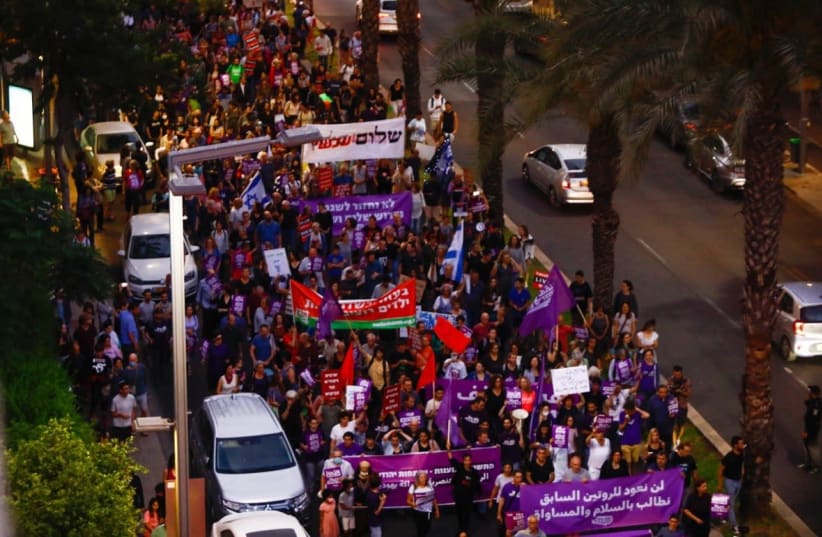ARTICLE AD BOX
Amal Tikva, a non-profit organization that works to support peacebuilding between Israelis and Palestinians, united experts, philanthropists, and civil organizations.
By EVE YOUNG FEBRUARY 4, 2025 17:24 Updated: FEBRUARY 4, 2025 17:31 Thousands of Jews and Arabs march in Tel Aviv for peace and coexistence, Saturday, May 22, 2021.
(photo credit: STANDING TOGETHER)
Thousands of Jews and Arabs march in Tel Aviv for peace and coexistence, Saturday, May 22, 2021.
(photo credit: STANDING TOGETHER)
Representatives from dozens of peacebuilding organizations gathered in Jerusalem Tuesday for a conference hosted by Amal Tikva, a non-profit organization that works to support peacebuilding between Israelis and Palestinians by bringing together experts, philanthropists, and civil organizations.
Co-Founder and CEO, Meredith Rothbart, emphasized that the gathering was not a "cute" meeting or space to be emotional together, but rather a joint Palestinian and Jewish effort to create real peace and to prevent the atrocities of October 7, 2023 and the ensuing war from ever happening again.
The conference created a space in which everyone believes peace and a non-violent future for Israelis and Palestinians is possible, Rothbart said, adding that the purpose of the gathering was to help collaboration and coordination between the organizations including by sharing best practices.
It was an intimate and friendly affair, with participants hailing from organizations that have participated in previous programming by Amal Tikva and multiple breakout sessions that allowed them to network and collaborate.
Rothbart also shared findings from a survey of peacebuilding organizations by Amal Tikva, done in the wake of October 7, which showed that 85% of programs that began before the war continued to operate in its wake, and just 10% of these organizations switched from operating as binational organizations to operating as uni-national organizations.
Some 40% of these organizations pivoted during the war to giving aid to impacted communities rather than continuing their previous programming, Rothbart highlighted.
Rothbart also touched on the more personal impacts of the war on peacebuilding work, stressing that the organizations are managed by individuals who are themselves touched by the many tragedies of the Israeli-Palestinian conflict.
This "makes the work [of peacebuilding] feel impossible, and yet you are still doing it," she applauded the organizations.
She also touched on the fact that since the outbreak of the war, there is no safe space in which all of the organizations involved with Amal Tikva programming can gather physically to be together.
Rothbart called this a "deeply painful realization," saying that it led her to question whether or not such a gathering should be held when not everyone can be there.
Stay updated with the latest news!
Subscribe to The Jerusalem Post Newsletter
"We have to try," she concluded, adding that "the situation is unbearable, but we must do our best."
A true top-down and bottom-up, comprehensive peace process has never been tried, according to Rothbart, who explained that while there have been many efforts and peace processes, none have fully harnessed collaborative work between all involved parties.
At the conference, the "diamond approach to peacebuilding" was highlighted. This approach involves combining efforts of diplomats and political leaders, grassroots peace organizations, and the "two sides of the conflict, i.e., Israeli and Palestinian societies," Amal Tikva explained.
Among the organizations that presented at the conference, sharing their strategies and where they fit in the field, The Jerusalem Youth Chorus stressed the importance of combining music with their dialogue-building work - explaining that music provides "relief" after the hard conversations.
Peace in the midst of a war
EMDR for peace highlighted how trauma-informed therapy can empower those who have been impacted by the conflict, enabling them to be agents of change in their own societies.
Feel Beit spoke about how creating a space with a low barrier for entry - through art - allowed them to bring Palestinians and Israelis together to create a shared culture and space of equality, sensitivity, and partnership.
Rothbart highlighted the apparent absurdity and the absolute necessity of working to create peace in the midst of a war.
"As a mother of four, whose husband has been in the army most of the last year fighting, [when I] say that I'm doing peacebuilding work - people look at me like I'm cross-eyed, they look at me like I'm a total nut."
This is because when people think of peacebuilding, they often think of old visions and ideas of what this means, she explained, saying that they often think those in peacebuilding assume that everyone is the same or love each other's children as much as their own.
"We're in such an opposite place in our society, where it's very much us vs. them," she explained.
Peacebuilding can be about finding a way to live together rather than love each other, she explained, highlighting that solving the conflict doesn't necessarily mean all parts of society embracing but rather confronting conflicts through structured, safe methods rather than violence.
"We can see peacebuilding as something that is for us - is for our family, is for our children," she countered.
"We can only control ourselves and our own actions. We can do everything in our power to make it a better reality. We cant change the other side, we can change ourselves. But if both sides take that decision, then we can actually just decide to live differently."

 3 hours ago
3
3 hours ago
3








 English (US) ·
English (US) ·